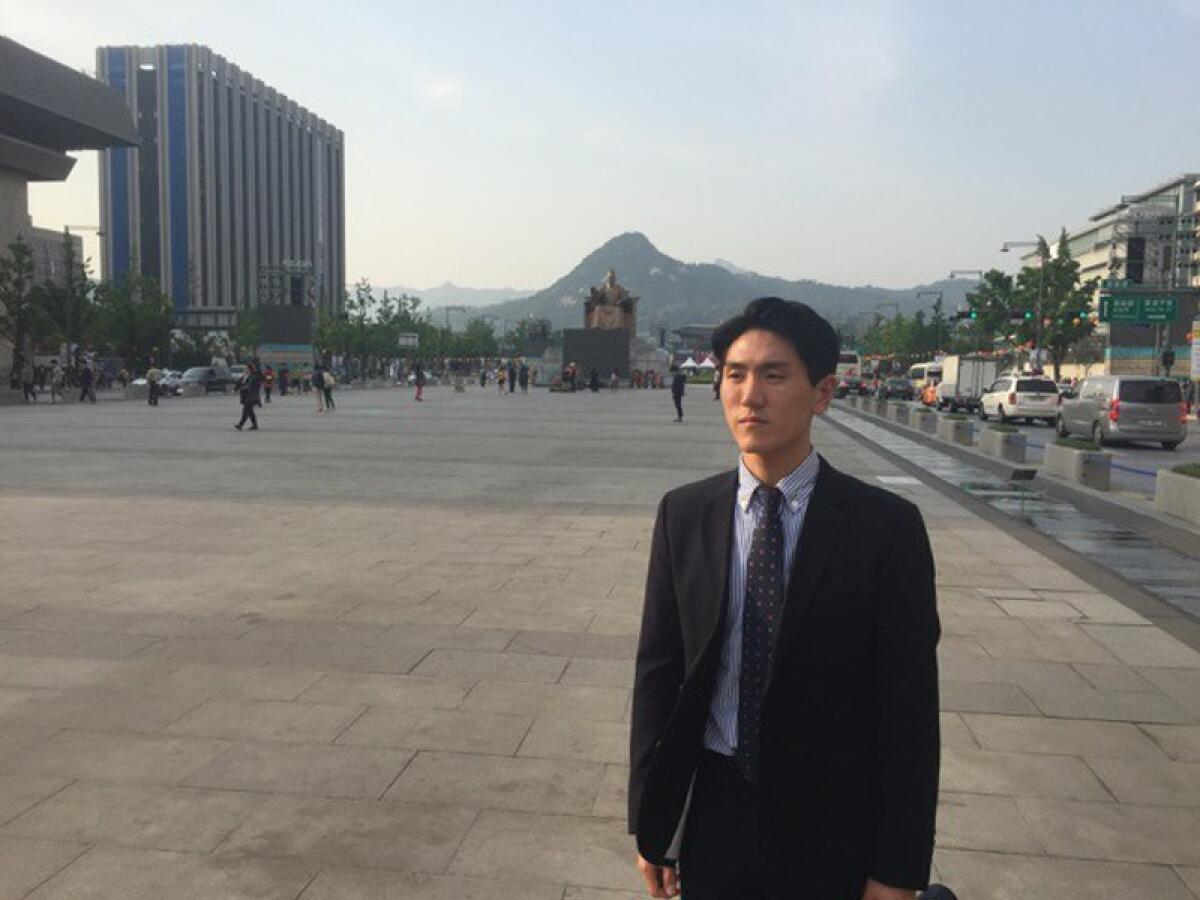South Korean conscientious objectors keep up fight against military service

Conscientious objector Lee Min-young, 25, was ordered to spend 18 months in prison for refusing to serve in the South Korean military.
It was a prison term, Lee Min-young says, that he had been anticipating his whole life, and on Friday it was finally confirmed: The 25-year-old was sent to spend 18 months behind bars.
That is Lee’s punishment for objecting to South Korea’s mandatory military service for all able-bodied men. The question of how to respect the civil and religious rights of those who refuse combat duty faces South Korean politicians and military seeking to maintain a fighting force capable of deterring North Korea.
Lee is from a family of Jehovah’s Witnesses and says that military service requirements to fire a weapon, and possibly engage in combat with North Korean soldiers, conflict with his religious beliefs.
Lee has also worried that his refusal to serve might hurt his prospects for career and marriage. “If I go to jail, I’ll be stigmatized forever. That stigma will be like a wall between me and the rest of society for the rest of my life,” Lee said in an interview last month. Still, he said he was holding fast to his beliefs, pointing to a passage from the Book of Proverbs as the basis for his decision: “Rejoice not when thine enemy falleth, and let not thine heart be glad when he stumbleth. Lest the Lord see it, and it displease him.”
Some 600 conscientious objectors are currently behind bars in South Korea, most of them Jehovah’s Witnesses, for refusing to serve in the 650,000-strong military. Though South Korea has several “alternative service” options for men like Lee, including working in administrative roles in government offices, even these recruits must go through a month of combat training — a requirement that some find unacceptable.
Jehovah’s Witness groups estimate that 18,000 South Korean men have served time for being conscientious objectors. South Korea’s mandatory military service has its roots in the 1950-53 Korean War. An armistice agreement ended the combat, but a peace treaty has never been signed. Actual conflict between North and South is rare but not unheard of; the last case involving casualties came in 2010, when two soldiers and two civilians were killed when North Korea shelled a South Korean island.
Proponents of mandatory service argue that South Korea must maintain a large, combat-ready military to deter North Korea and respond in case of an attack. “Peace is not a birthright, but can only be preserved through military readiness,” South Korea’s Ministry of National Defense says in an e-book published on its website. (About 28,500 U.S. troops are also stationed in South Korea.)
In May, Amnesty International released a report on South Korea’s conscientious objectors, calling on the government to release the 600 men currently incarcerated on such charges.
“Military service is seen as a ‘patriotic duty’ by mainstream society due to the security situation in the Korean peninsula. Men who do not fulfill this duty are often considered to be traitors,” Amnesty wrote in the report, which found that more than 90% of jailed conscientious objectors in the world are South Korean.
In 2007, under liberal President Roh Moo-hyun, the South Korean government announced plans to expand alternative service options for conscientious objectors, but those plans were put on ice with the election of the conservative Lee Myung-bak the following year.
In May, a South Korean court acquitted three men facing charges for refusal of military service. All three gave religion as their reason.
“It is necessary to provide a harmonious interpretation of freedom of conscience under the constitution and the duty of national defense prescribed in the constitution, as these two constitutional values come in conflict with each other,” the court ruling stated.
Provincial courts have twice before issued similar rulings that were later overturned by the Supreme Court. In the case last month of the three objectors, the ruling will be reviewed by the Supreme Court and is likely to be overturned, in line with precedent.
Lee said last month that he had been encouraged by the May ruling. He was not available for comment after his own hearing Friday in the Supreme Court, his last and whose outcome he cannot appeal.
Lee was taken into custody Friday and will probably be transferred directly to a prison where he will serve out his sentence, said Steven Park, public information officer for the Jehovah’s Witnesses Korea branch, that advises conscientious objectors.
Lee said in May he hadn’t yet decided on a particular career to embark on once he is released, but he planned to spend his time in prison praying and making plans. His family operates a small jewelry store in Yangpyeong, about an hour east of Seoul.
Despite his loss of freedom, he said he had no regrets about objecting to military service.
“Militaries are supposed to exist to work for peace, but even though we have this huge military, we’re not safe,” Lee said. “We need some other way of achieving peace -- not through force.”
Borowiec is a special correspondent.
More to Read
Start your day right
Sign up for Essential California for news, features and recommendations from the L.A. Times and beyond in your inbox six days a week.
You may occasionally receive promotional content from the Los Angeles Times.






